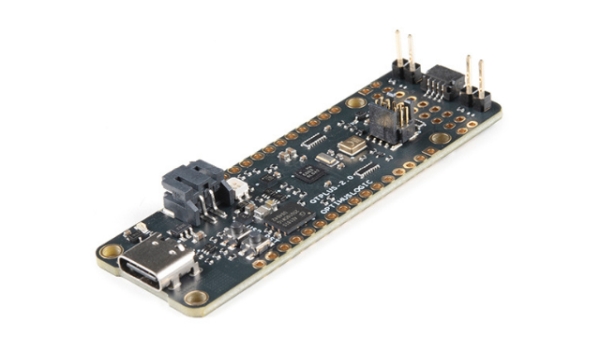Summary of SPARKFUN QUICKLOGIC THING PLUS FEATURING EOS S3 MCU AND EFPGA IS NOW AVAILABLE AT $45.95
The SparkFun QuickLogic Thing Plus is a powerful FPGA development board designed for ultra-low power applications. It features the QuickLogic EOS S3 MCU combined with an embedded FPGA offering 2,400 logic cells and an Arm Cortex-M4F MCU running at 80 MHz with 512 KB RAM. The board supports machine learning via TensorFlow Lite and SensiML, and software tools like SymbiFlow and Renode for FPGA development. It includes onboard sensors—a 3-axis accelerometer and a digital PDM microphone with Wake-on-Sound—making it suitable for ML projects. Power options include USB Type-C or Li-Po battery with integrated charging.
Parts used in the SparkFun QuickLogic Thing Plus:
- QuickLogic EOS S3 MCU + eFPGA SoC (Arm Cortex-M4F, 80 MHz)
- 512 KB RAM
- 16 Mbit SPI NOR flash memory
- STMicro LIS2DH12TR accelerometer
- Vesper VM3011-U1 Digital PDM microphone with Wake-on-Sound
- USB Type-C connector
- Li-Po battery JST connector
- Microchip MCP73831/2 Li-Po battery charging IC
- SWD programming connector
- UART interface
- I²C interface
- I²S interface
- SPI interface
- Breadboard-compatible 0.1″ (2.54 mm) pitch headers
SparkFun QuickLogic Thing Plus was originally crowdfunded on CrowdSupply that raised around $4500. If you did not back the product back then, no worries, you can buy it now on the SparkFun product page. SparkFun QuickLogic Thing Plus is a powerful FPGA board that comes with a Feather-footprint. The product from the collaboration of SparkFun and QuickLogic makes it a rapid prototyping open-source hardware with ultra-low power SoC for power-sensitive applications.

This FPGA board is built around QuickLogic’s EOS S3 MCU + eFPGA SoC featuring embedded FPGA (eFPGA) technology with 2,400 effective logic cells. The Arm Cortex-M4F MCU provides 512 KB of RAM. One of the important features to note is the out of the box support for machine learning algorithms with TensorFlow Lite and SensiML. However, since it has eFPGA, the software support in that regard is SymbiFlow and Renode.
Specification Of SparkFun QuickLogic Thing Plus:
- CPU: QuickLogic EOS S3 MCU + eFPGA SoC featuring Arm Cortex-M4F MCU running at up to 80 MHz
- Form factor: Breadboard-compatible 0.1″ (2.54 mm) pitch headers – all headers are pre-soldered
- Dimensions: 2.75″ x 0.9″ (70 mm x 22.9 mm) footprint
- Storage: 16 Mbit SPI NOR flash
- Sensors: Accelerometer, Digital pulse density modulation (PDM) microphone
- Interfaces: SWD programming connector, UART, I²C, I²S, SPI
- Power supply: USB Type-C connector or via Li-Po battery
As mentioned earlier, the QuickLogic EOS S3 SoC is an ultra-low-power chip, so the board can be powered using a Li-Po battery as well with onboard charging circuitry using the Microchip MCP73831/2 and has a standard Li-Po JST connector. When it comes to ML applications, it is always an added advantage when there are sensors onboard. So, to solve this the designer has provided the board with an accelerometer with STMicro LIS2DH12TR and digital pulse density modulation (PDM) microphone with Wake-on-Sound (WoS) feature through the Vesper VM3011-U1.
Read more: SPARKFUN QUICKLOGIC THING PLUS FEATURING EOS S3 MCU AND EFPGA IS NOW AVAILABLE AT $45.95
